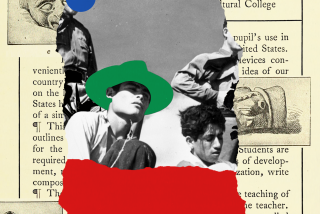‘Ignorance Is No Bliss’
- Share via
“Ignorance Is No Bliss” (editorial, Oct. 10) covers but the tip of the iceberg. Tests of cultural literacy that are limited to questions of identification (who wrote what, when did that occur, where is such and so?) naturally expose a vast amount of ignorance not only among college students but also the general population. Yet I venture to say that most of our students are exposed to the answers at some time in their schooling. The forgetting of memory learning is notorious.
A far more important test of cultural literacy would involve the ability of the individual to comprehend, analyze and evaluate the substance of the material studied (what is the significance of the Magna Carta, the Civil War, “The Tempest”?). How does my understanding of the culture of man influence my political, socioeconomic, and aesthetic values, my moral behavior, my appreciation and enjoyment of life? Since such questions are not subject to multiple-choice, true-false answers, any educational system that limits itself to such tests encourages only a rote memory, and is equally deceptive not only to the “flunker” but also to the “passer.”
The “flunker” becomes the discouraged drop-out from formal learning and the despiser of “highfalutin” culture, and the “passer” may believe he is “cultured” because he can drop names and dates, but frequently never understands the deeper significance of the material because he has never been challenged to.
Obviously, it is far more difficult and time-consuming to test for true cultural literacy; essay exams, oral discussions and direct observation of behavior are among the techniques that have been used. It is equally obvious that testing goals and methods determine curriculum goals and methods. An educational system geared to standardized testing is geared to the perpetuation of the superficial.
BURTON HENRY
Temecula


